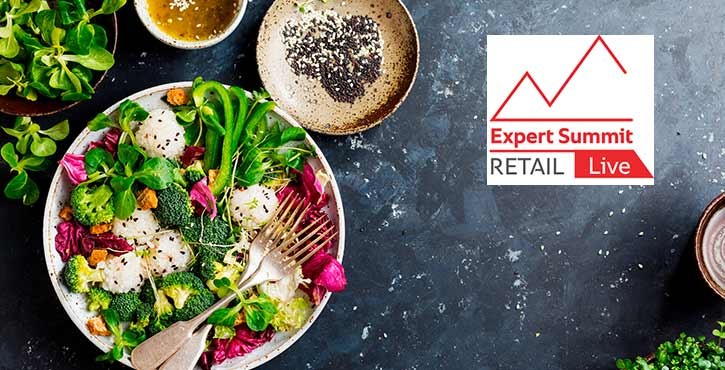News – 2021-12-01
What does the future hold for supermarkets, convenience stores and petrol stations? What has changed as a result of the pandemic? How can they adapt to changing conditions? On these and other retail topics, almost 50 international opinion leaders met in mid-November at RATIONAL's invitation to the Retail Summit in Dublin. Presentations by renowned speakers such as Scott Annan of Blue Ananta, Gavin Rothwell of Food Futures Insights, Thomas Ennis, CEO of Thomas Ennis Group, Nathan Watts of Interstore Schweitzer, Marijke Streng, Lead Foodservice Albert Heijn, on trends and Mike Forgaty of Choice provided insights into new ideas and concepts. The supermarket safari that followed showed what these look like in practice. Benjamin Nothaft, one of the initiators at Rational for this event: "There is certainly a lot of momentum coming out of the Retail Summit and the lively conversations showed that the topic of foodservice in retail is more relevant than ever."

First of all, stationary trade is alive and well. Under one condition: it must develop intelligent concepts. The speakers showed some of these possible concepts from different perspectives. Scott Annan collected ideas from all over the world and made it clear that petrol stations in particular need to rethink: The more electric vehicles there are, the less need there will be to drive to a motorway service station or petrol station. The routine of refuelling and buying provisions is become obsolete - but what comes next?
Marijke Streng impressively demonstrated how supermarkets adapt to the respective customer requirements. Depending on the location of each Albert Heijn store, the size, product range, opening hours and convenience level are adjusted.
The idea is that there is always a suitable solution wherever the customer is. At the train station, for example, a store is unmanned, open 24 hours, but has very little product depth. Whereas the small city store is fully geared towards “Grab & Go”. And larger stores have speciality bars with sushi, special product placements with external partners and a wide range of takeaway food in addition to the classic supermarket range.
But customer preferences change, so concepts and the store design have to be adapted accordingly. As a rule, this is a costly affair. That is why the Schweitzer design studio has dedicated itself to this topic and presented its solution in Dublin: Creative Director Nathan Watts demonstrated how to remain flexible by cleverly arranging fixed elements such as water or power lines and, for example, how to reconfigure an entire shop without much effort and thus react to changing customer behaviour, such as the desire for new food service concepts like sushi.
So what does Dublin have that other cities don't? Put simply: numerous innovative supermarkets. A supermarket safari was created in collaboration with Gavin Rothwell and Benjamin Nothaft, which showed how ideas can be turned into high-turnover retail spaces. Like SuperValu Kilmainham, for example: Just opened in a new housing development, the local supplier is winning over the entire neighbourhood with fresh fruit, vegetables, fish and meat - and with food produced in-house. Hot to go, cold to go, for now, for later, for different times of the day. With an enormous amount of flexibility in production and among the employees.
SPAR Merrion Row is a classic convenience store where a construction worker can quickly grab a good coffee, enjoy a hot meal during the lunch break and run by the salad bar on the way home from the office. Garlic chicken wrap, chicken pesto pasta and chilli sin carne, among many other dishes, are prepared daily in the in-house kitchen. Products for daily needs are not lacking either, but the appeal of the store, which has been set up in the modified Metrochic, comes from the quality of the stay. It’s no wonder that this SPAR has won multiple awards.
Located in a large, open square amidst numerous other shops, Fresh the Good Food Market impresses with its virtually endless selection of everything a hungry person needs: ready-to-eat and semi-prepared dishes as well as meal kits, huge wine selection, seasonal specials. And there are even fresh flowers to please the eye. Sushi, pastries, chicken in all variations, pre-packed salads, salads to assemble and the recommendation of the week. There is a self-checkout function for smooth payment processes. There are customers who come every day. That’s all it takes.
Centra is the term for convenience stores in Ireland. All stores are run by an independent owner. The Wellington Qay location is a good example of the focus on food-for-now, which means eating on site or at least as soon as possible after purchase. In addition, Centra has made a name for itself by integrating other brands into the stores and thus mutually benefiting from each other's expertise.
Fallon & Byrne could be described as a mecca for foodies: In the food hall, there is everything that the hungry city dweller needs and a lot that they didn't know before. From a quick coffee in between meals, to fresh pastries, a visit to the restaurant, no wish is left unfulfilled. All specialities are also available online. It is no longer a neighbourhood market, more of a legend.
One thing is common to all stores: They make a significant part of their sales with convenience products, which they usually produce themselves. Robert Munday, EVP Marketing & Customer Solution at Rational, formulated the challenges that arise: "When ready-made meals are in greater demand, the demands on production also increase. At the same time, there are few skilled staff in retail, so the kitchen equipment must be able to take on many tasks and provide flexible support throughout the day, across a wide product portfolio. That’s exactly what our iCombi and iVario units are designed for."
The hunger for exciting shopping experiences is there - so supermarkets outside Dublin should also start getting busy.